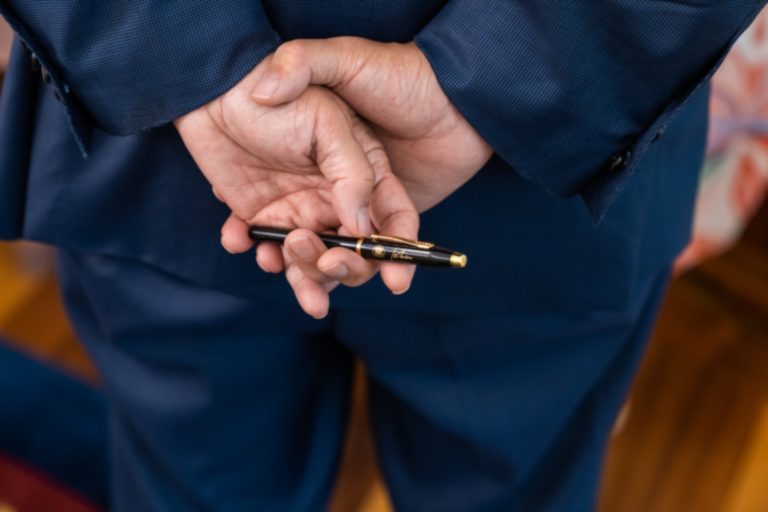Do you need two people to witness you sign your will? Three? What about a notary? If you’ve gone to the trouble of writing a will, it makes sense to ensure that your will is as safe from being questioned and disputed as reasonably possible.
What the Law Says: Virginia Code § 64.2-403
Here’s what Virginia Code § 64.2-403 has to say about the matter:
A. No will shall be valid unless it is in writing and signed by the testator, or by some other person in the testator’s presence and by his direction, in such a manner as to make it manifest that the name is intended as a signature.
B. A will wholly in the testator’s handwriting is valid without further requirements, provided that the fact that a will is wholly in the testator’s handwriting and signed by the testator is proved by at least two disinterested witnesses.
C. A will not wholly in the testator’s handwriting is not valid unless the signature of the testator is made, or the will is acknowledged by the testator, in the presence of at least two competent witnesses who are present at the same time and who subscribe the will in the presence of the testator. No form of attestation of the witnesses shall be necessary.
Breaking Down the Requirements
Let’s look at this section of the statute piece by piece. First, a will is not valid unless it’s in writing and signed by the person making the will (the “testator”). The testator can also direct someone to sign in their place, and that signing must be done in the testator’s presence and done in a way that makes clear that that is what the testator intends.
Second, if a testator wrote the will wholly by hand, then it is valid even if it is not signed, but you will need two witnesses who do not have a stake in what the will says to testify that the will was indeed written by the testator by hand.
Third, if the testator did not write the whole will by hand, then it will need to be signed or acknowledged in the presence of two witnesses who are “competent” meaning they are adults with no impairments. Those witnesses will also need to sign the will.
So, in most situations, a person signing a will should do so in the presence of at least two competent witnesses.
Self-Proving Affidavits and Acknowledgments
There are some additional practical considerations to keep in mind when it comes to witnesses. When a person dies, those seeking to put that person’s will into effect bear the burden of proving that the legal requirements for signing were satisfied. Virginia law provides a way to do this without having the witnesses come to court and testify to the fact that they did in fact witness the signing of the will. The testator can instead have the witnesses use “self-proving affidavits,” which are provided for under Virginia Code § 64.2-452. With a self-proving affidavit, the testator and the witnesses sign a document that makes clear that they witnessed the signing of the will. They sign the document before a person authorized to administer oaths, such as a notary public. This self-proving affidavit has the same weight in court as the live testimony of the witnesses.
An alternative to the self-proving affidavit is to use an acknowledgment form under Virginia Code § 64.2-453. This is a form that is shorter than the affidavit and does not require the signatures of the testator or the witnesses–it’s just signed by the notary public or similar official. Although a bit easier, the statute does not explicitly give this method the same weight in court as an affidavit.
So, in a nutshell, Virginia law requires most wills to be signed in the presence of two witnesses, and the law provides self-proving affidavits for those witnesses as a method for proving that the will was properly signed (or “executed” in legal terms) without having those witnesses come to court and testify about the matter.
Quick Guide: Signing Requirements for Other Estate Planning Documents
Finally, let’s go through the signing requirements for a few other types of documents typically found in estate plans, rapid-fire style:
- Trusts – generally should be signed by the grantor and the trustee in the presence of a notary
- Powers of Attorney – generally should be signed by person granting the power of attorney in the presence of a notary
- Advance Medical Directives – generally must be signed by the person establishing the directive along with two witnesses (see Virginia Code § 54.1-2983) and should be signed in the presence of a notary
- Anatomical Gift Forms – if not covered in the testator’s will, medical directive, or their driver’s license application, the testator and two witnesses must sign this anatomical gift form (see Virginia Code § 32.1-291.5).
The Bottom Line: Don’t Cut Corners
The bottom line is that when it comes to documents related to an estate plan, two witnesses and a notary are often required to provide the best protection from a legal challenge down the line. Even when not required, taking these extra steps is wise. These are some of the most important documents that a person will sign in their lifetime, and it’s prudent to make sure not to cut any corners when it comes to safeguarding their validity.
When in Doubt, Talk to a Lawyer
And if you have questions regarding the formalities surrounding the signing of estate planning documents, seek the counsel of an attorney. As an attorney myself, of course I would say that, but nevertheless, I stand by this recommendation, since your specific circumstances may have particular quirks that will benefit from review by a specialist.
